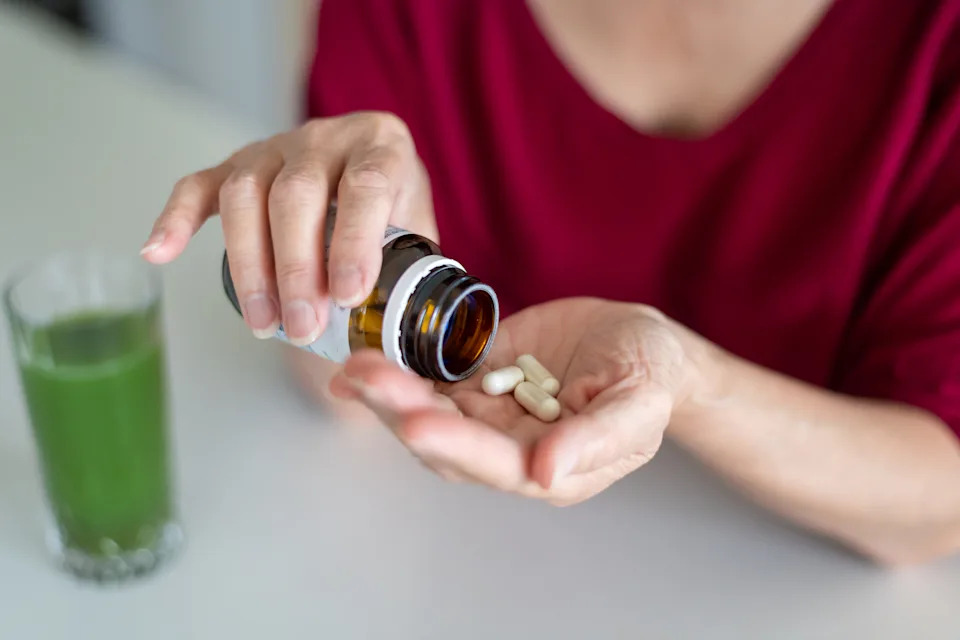Sports
Expert-Recommended Supplements to Ease Menopause Symptoms

Navigating the changes that accompany menopause can be challenging, particularly when it comes to maintaining optimal nutrition. Dr. Michelle Jacobson, an OBGYN and menopause specialist at Women’s College Hospital and Mount Sinai Hospital in Toronto, emphasizes the importance of dietary supplements to support health during this transition.
As women experience menopause, they face significant hormonal fluctuations that can impact various aspects of their health, including mood, cognition, and bone density. Dr. Jacobson explains that these changes can be distressing and may lead to symptoms such as brain fog, anxiety, and disrupted sleep. “Nutrient deficiencies can happen because of menopause,” she states, highlighting that supplementation can help mitigate risks and address these deficiencies.
Understanding Hormonal Changes
During menopause, levels of estrogen, testosterone, and progesterone decline. This hormonal shift can affect critical areas of the brain responsible for planning, emotional regulation, and memory. Cognitive changes often accompany these hormonal alterations, with many women reporting difficulties with concentration and mood swings. Additionally, bone density is at risk; research indicates that the average woman loses about 10 percent of her bone density during menopause, with some losing up to 20 percent in the years surrounding this phase.
In light of these challenges, Dr. Jacobson advocates for specific supplements that can help alleviate menopause symptoms. Here are some recommended options:
Key Supplements for Menopause Relief
Ashwagandha is gaining recognition for its potential benefits during menopause. Dr. Jacobson notes that studies have suggested its effectiveness in improving mood, sleep, and alleviating hot flashes. Research indicates that the root extract of this evergreen shrub can provide relief for mild to moderate climacteric symptoms, making it a viable option for many women.
Chasteberry, derived from the chaste tree, has been shown to assist with premenstrual syndrome (PMS) and premenstrual dysphoric disorder (PMDD). A meta-analysis found that women taking chasteberry were over 2.5 times more likely to experience symptom relief compared to those on a placebo. Dr. Jacobson points out that during perimenopause, women may often feel as though they are experiencing persistent PMS symptoms, making chasteberry a suitable supplement.
Calcium is essential during menopause to counteract the effects of reduced estrogen levels, which can lead to bone density loss. Adequate calcium intake is crucial for preventing fractures, especially in the perimenopausal and postmenopausal stages. “It’s best to obtain calcium from food whenever possible,” Dr. Jacobson advises, noting that dairy products, leafy greens, and fortified foods are excellent sources.
Alongside calcium, vitamin D plays a vital role in calcium absorption. Dr. Jacobson highlights that obtaining sufficient sunlight exposure can be challenging, especially in regions with limited sunlight, making supplementation important during menopause.
Magnesium may also provide relief for nighttime symptoms such as hot flashes, night sweats, and muscle cramps. It is known for its calming effects and can assist in calcium absorption while potentially alleviating migraine symptoms.
A vitamin B complex is beneficial for cognitive support, particularly for those who may have dietary restrictions. Dr. Jacobson emphasizes that adequate B vitamin intake can also help manage migraines, which may become more frequent due to hormonal fluctuations.
Protein intake becomes increasingly important during menopause for maintaining lean muscle mass. Dr. Jacobson suggests aiming for about 70 to 100 grams of protein daily, which can be challenging to achieve through diet alone. In such cases, protein supplements can be beneficial.
Finally, the significance of fiber cannot be overlooked. Increasing fiber intake can promote digestive health, particularly during perimenopause when bloating may become more common. Dr. Jacobson recommends psyllium husk supplements for those who struggle to consume sufficient fiber through their diet.
Dr. Jacobson’s insights underline the importance of considering dietary supplements during menopause. While these recommendations can provide support, it is crucial for individuals to consult healthcare professionals before making any changes to their diet or supplement regimen.
This article aims to inform and should not serve as a substitute for professional medical advice. For personalized guidance, consulting a qualified medical professional is always advisable.
-

 Politics4 weeks ago
Politics4 weeks agoSecwepemc First Nation Seeks Aboriginal Title Over Kamloops Area
-

 World5 months ago
World5 months agoScientists Unearth Ancient Antarctic Ice to Unlock Climate Secrets
-

 Entertainment5 months ago
Entertainment5 months agoTrump and McCormick to Announce $70 Billion Energy Investments
-

 Science5 months ago
Science5 months agoFour Astronauts Return to Earth After International Space Station Mission
-

 Lifestyle5 months ago
Lifestyle5 months agoTransLink Launches Food Truck Program to Boost Revenue in Vancouver
-

 Technology3 months ago
Technology3 months agoApple Notes Enhances Functionality with Markdown Support in macOS 26
-

 Lifestyle3 months ago
Lifestyle3 months agoManitoba’s Burger Champion Shines Again Amid Dining Innovations
-

 Top Stories2 months ago
Top Stories2 months agoUrgent Update: Fatal Crash on Highway 99 Claims Life of Pitt Meadows Man
-

 Politics4 months ago
Politics4 months agoUkrainian Tennis Star Elina Svitolina Faces Death Threats Online
-

 Sports5 months ago
Sports5 months agoSearch Underway for Missing Hunter Amid Hokkaido Bear Emergency
-

 Politics5 months ago
Politics5 months agoCarney Engages First Nations Leaders at Development Law Summit
-

 Technology5 months ago
Technology5 months agoFrosthaven Launches Early Access on July 31, 2025





















